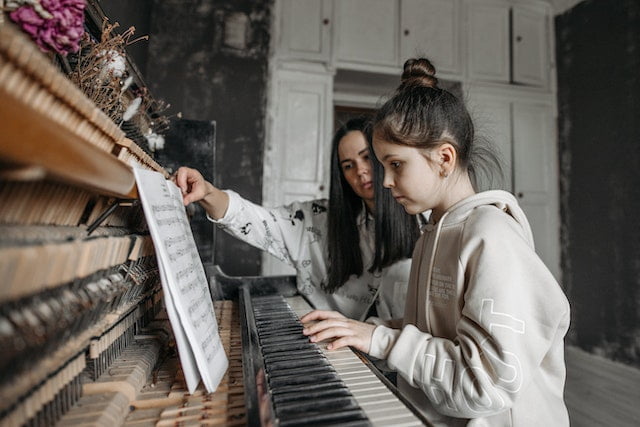Advantages of Students Reaching Potential Through the Power of Making Music
Students who play music can work harder, stay engaged in school, have better study habits, and show more commitment than kids who do not take music lessons. They can achieve satisfaction from accomplishing goals, such as mastering a new piece of music. This will serve them well in all aspects of life.
Develops motor skills
Music helps develop fine motor skills and improves hand-eye coordination. Students also learn to work with a score, which requires excellent memorization abilities. These skills will help students as they continue their education and later in their professional lives with the help of non-profit foundations such as Save The Music Foundation. Music also supports reading skills, as there is a strong connection between the brain areas that process music and those that process language. This is known as “near transfer” and can benefit a student’s education. Music has also been known to reduce stress levels. This can be helpful during high-pressure situations such as exams or job interviews.
Learns discipline
Kids who practice music regularly learn discipline that can help them succeed in school and other areas of their lives. This includes learning to set goals, work hard, and overcome obstacles. Music helps develop spatial intelligence, improving pattern-recognition abilities necessary for advanced math and other subject areas. It also helps children develop inhibition control, essential in avoiding impulsive behaviors. Some studies show that musical training improves children’s IQ and academic achievement, and these benefits are independent of socioeconomic status.
Develops study habits and creativity
Music can help students develop healthy study habits. For example, learning a musical instrument can help students memorize lyrics and notes. This can improve their academic performance and even fight against longer-term memory illnesses like Alzheimer’s. Music can also help students stay motivated while studying. This can be especially helpful for tedious subjects. The desire to perform well in music teaches kids that hard work pays off, which can inspire them to do the same with other academic subjects. Modern research has shown that creative thinking is inherent to normative cognitive functioning and depends on fundamental cognitive processes. Creative thinking can be facilitated through various means, such as brainstorming and making random connections. Learning to play music can boost creativity by increasing originality and imagination. It also keeps the brain in an optimum state for creative tasks. Moreover, students who take music lessons learn to develop creativity by experiencing a sense of achievement from successfully reaching goals and developing their skills over time. This enables them to become better at time management and discipline.
Develops self-esteem and social skills
Music is a powerful tool to reach a larger audience in a shorter period. Whether it’s in happy or sad situations, music can bring people together. Developing a musical education helps students build their self-confidence and improve their mental health. A student’s feeling of accomplishment when they successfully play a song is a great way to boost their confidence in other subjects. They might even be able to perform better in a job interview or important exam! Music teaches kids to work together, communicate, and support one another. It also helps them learn about rhythm, structure, and timing. Playing a musical instrument requires focused attention. This teaches kids to focus on tasks in challenging circumstances. Performing also teaches kids to adhere to strict expectations, which can help them in future academic and professional environments. Mastering a new piece of music builds self-confidence and self-esteem. It also teaches kids to take responsible risks. This translates into their emotional and social lives.
Develops empathy and communication skills
Several studies have found that people with musical experience better interpret emotions conveyed through music. In particular, highly empathic individuals can feel what musicians attempt to express without becoming sad. Making music in groups teaches children how to respect each other and work together as an ensemble. It also challenges them to watch the faces of others for expressions and moods, which is good practice for reading other people’s body language and emotions. Empathy is a significant factor in social development, decreasing the likelihood of developing manifest and relational aggression. Music education develops students ‘ communication skills, whether performing on stage or simply singing in the shower. Learning to play an instrument or sing involves memorizing and performing complex patterns. This pattern recognition can help students with other academic subjects like math and science. Making music also allows kids to express emotions in a controlled environment, which can help them learn constructive ways of dealing with stress and anxiety. Studies show that group-based musical training can improve kids’ language development. Moreover, playing music can make learning fun and exciting.
Develops teamwork and leadership skills
Many musical education programs revolve around students working together as part of a choir, band, or orchestra. This teaches teamwork skills and how to work as an influential group member. Music also helps kids and students improve their memorization skills, particularly if started early on. This can help with academic subjects like maths and pattern recognition. Developing a talent in music requires hard work, discipline, and perseverance. These skills can then be transferred to other areas of learning and life. This includes responsible risk-taking, communication, and teamwork skills. The goal-oriented, teamwork-based environment of music ensembles helps students develop leadership skills. These skills can be used in all aspects of life, from school to work and beyond. Music education also teaches students to be creative thinkers. They learn how to solve problems uniquely, which helps them excel in academic subjects like math and science. They also gain the satisfaction of reaching their goals, a great feeling that can carry over to other areas of their lives. They become more confident, and they may even become leaders in their communities.




